Presenting our tribute to all
the Breast Cancer Survivors and those close to them.
In their battle against breast cancer two ordinary
women, with ordinary jobs and ordinary lives, were revealed to be not ordinary
at all but extraordinary individuals. We introduce you to Susan Gray of
Walnut Creek, California, the originator of the "Raging Light"
breast cancer quilt project and Judy Reimer of British Columbia, Canada,
founder of the "Life Quilt for Breast Cancer" project. Both have
had an immeasurable impact on the lives of countless other women who battle
breast cancer. Both with quilt projects serving as a rallying point, have
provided support, comfort and solace for so many. Due to the extensive
background on these two projects this feature is being presented in two
parts with Part II in next month's Gallery.
"Raging Light" Breast
Cancer Quilt Project - United States
"Life Quilt for Breast
Cancer" Project - Canada
Part I
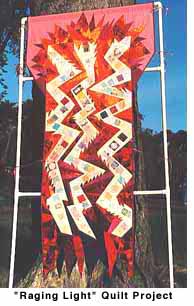
"Raging
Lights" Breast Cancer Quilt Project - United States
The prayer flags taken on the Breast Cancer Funds
1995 expedition on Mount Aconcagua, Argentina, the highest peak in the
Western Hemisphere, captured Susan Gray's imagination and she resolved,
in the spring of 1996, to make a small quilted names banner to take along
on Breast Cancer Fund raising activities. Serendipitously, which is often
the way inspired endeavors unfold, each small step along this journey,
led to next as if guided by destiny. Susan lives in Walnut Creek, Ca. and
is a senior database administrator for Pacific Bell. As her conception
of this undertaking evolved, one
day a flash of a brilliant insight hit her right between the eyes: why
not mate the Internet with the tradition of the quilting bee? Motivated
by this idea, Susan sent notices out on the Internet to quilting sites
and breast cancer support groups, inviting anyone interested in participating
in this project to send a 3 inch name square containing the name of a breast
cancer victim to be sewn onto the name banner. Her envisioned project began
with the hope that an all-to-silent community would come together and support
this venture. At first, she was unsure whether she'd receive even one response.
Quite the opposite of her initial doubts is what actually happened: Susan
was deluged with letters and fabric squares which arrived from all over
the U.S. for months. Within two months she had already received more than
100 quilt pieces. Some were accompanied by wrenching letters, detailing
the story behind the name. Others were sent anonymously, without even a
return address.
In making this quilt, Susan was attempting to capture the anger and frustration
she felt concerning the deaths of her beloved mother, 2 special aunts,
and a best friend who all lost extremely painful fights against breast
cancer. These four women are etched into Susan's soul and memory and their
names are stitched, in memorium, onto this exceptional quilt banner. What
began as a way for Susan to deal with her own pain and loss, has evolved
into a labor of love, a majestic art piece and a testament to the ravages
of breast cancer, all in one. Though she still alternately smiles and cries
when she speaks of it, she has ultimately found it to be not only a painful,
but an unexpectedly empowering remedy.
Susan
christened the quilt-banner, "Raging Light", after the Dylan
Thomas poem , a portion of which is included in an inscription on the back.
In August of 1996, with a bundle of fiery fabrics for inspiration and a
stack of name squares swatches representing over 150 breast cancer victims
and survivors on hand, Susan began constructing the banner: designing,
machine piecing, and machine quilting it. To put it all together, Susan
used a 30 year old Kenmore sewing machine she had received as a high school
graduation gift. Surrounded by her cherished memories, she started integrating
her own with the memories of those who had sent squares of their loved
ones. "I wanted to put all these names on the quilt, but I didn't
want it to be sweet and frilly" she says. Assembling the pieces in
the shape of lightening, she employed bright, bold colored materials and
gave the work a jagged edge. The lightening metaphor symbolizes both anger
and energy. "It's an `in-your-face design" Susan explains, `but,
I didn't care if people liked it. I just didn't want them to ignore it.
That's why I separated these nice little name squares with screaming fabric."
Susan's intention is to rouse the awareness that breast cancer remains
a major health threat to women everywhere.
Still
a "work-in-progress" "Raging Light" was first displayed
on September 20, 1996 at the Breast Cancer Fund's "Climb Against the
Odds" on Mount Tamalpais, in Mill Valley near San Francisco, Ca. After
another frantic month of sewing, "Raging Light" was completed
on the morning of the "Susan G. Komen Race For the Cure", held
in San Francisco. In the race, as Susan and her friend, carried the 9 foot
tall quilt, mounted on PVC poles, high above the crowds, the pink ribbon
print fabric on the back, became a canvas for more names: " Recording
names is really powerful for people", says Susan; "there's room
for hundreds. If people want to be included, we want them on there!".
Everywhere that "Raging Light" has been displayed, viewers have
been invited to sign their own names or those of friends and family who
have been touched by breast cancer. Over 1000 names have been stitched
or written onto the back of the 9 foot by 4 ft banner in indelible ink.
"The thing a lot of people have said is that they really like the
size of the banner. It's big enough that it's dramatic, but it's also small
enough that it's still personal. It doesn't have that overwhelming factor
that the AIDS Quilt does." The backing fabric features looped pink
ribbons which have since become the disease's rallying symbol. Since the
project began, half of the names represent survivors; the other half, victims
who have lost their battle with this devastating scourge.
The "Raging Light" project has been
so successful that additional Panels 2 and 3 are now in progress. "Raging
Light" will become the centerpiece of an Earth, Wind and Fire Triptych,
with "Raging Light" as the center "Fire" panel. The
"Earth" panel, in browns and greens will commemorate caregivers
and their patients . The "Wind" panel, in blues and grays, will
be in honor of those left behind when a loved one succumbs. Currently,
completion of these two panels is scheduled for the Fall of 1998.
Next month in Part II with more on the "Raging
Light" project; what inspired the inscription on the back of the quilt;
the new additional panels in progress and Judy's quest for creating greater
awareness and support with the help of corporate sponsorhip.
To find out how you or a loved
one can be included please visit the Breast Cancer Fund website at http://www.breastcancerfund.org/raging_light.html
or e-mail Susan at svgray@pacbell.net
"Life
Quilt for Breast Cancer" Project - Canada
 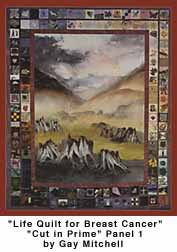 ------ ------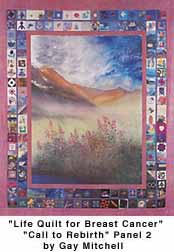
In 1996, "Chatelaine", a Canadian women's
magazine ran a contest entitled "Women of Inspiration" The Grand
Prize Winner was Judy Reimer of Vancouver, B.C. The qualification required
was to be just an ordinary woman, with an ordinary life: kids, job, neighbors.
But this ordinary woman also had to have an extraordinary trait: the ability
to make a difference. The following story will elucidate unequivocally
why Judy she chosen.
Judy was diagnosed with breast cancer in 1990, at age 32, and the mother
of two very young children: Louise 1 yr. old and Brolin, 2 yrs. old. A
mastectomy and chemotherapy resulted in remission but the side effects
forced her to relinquish her career as a psychiatric nurse and teacher
in 1992. One year later, the cancer had metastasized to her bones. Judy,
however, was not one to remain idle. Whatever
time she had left, she determined to face head-on and make it meaningful.
With this goal in mind, Judy went to see a career counselor. Two themes
emerged from this session: the way breast cancer had changed her life and
her love of the needlearts. As she and the counselor spoke, the germ of
a concept started to grow: this small first step was The beginning of her
odyssey to what later became the "Life Quilt for Breast Cancer"
project. Over the following months, Judy's days were spent meeting representatives
from local health departments, Canadian Cancer Society branches, the Canadian
Breast Cancer Foundation and anyone else who might be able to offer resources
or support for her visionary project.
Judy's original intention was to leave something beautiful behind for her
children: "I want my children to be able to say `My mom had breast
cancer but it didn't destroy her.' I want to leave a legacy of hope and
healing."
The vision began to take shape in actuality when Judy began collaborating
with Gay Mitchell, a Coquitlam, B.C. fabric artist, who is responsible
for the quilt's overall design (and the artist who painted the watercolours
that form the center of each panel.). It was conceptualized as a series
of three panels, using the metaphor of the forest to symbolize a woman's
battle with breast cancer, from health, to disease to rebirth. "We
wanted to show that even when absolute survival isn't possible, rebirth
and new life is", says Judy. Each panel would be bordered by six inch
squares contributed by people whose lives had been affected by breast cancer
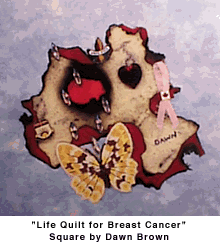 |
In 1991 I was diagnosed with fibrocystic
breast disease in both breasts. For three years, no one was concerned except
me. Testing just concluded the fibrocystic disease diagnosis. In 1994, a
full biopsy confirmed that I had developed invasive ductal metastatic breast
cancer. I had modified radical mastectomy and seven positive nodes under
my arm and in my neck.
Horror, grief, anxiety, permeated every cell of
my body. As soon as I was able I started chemotherapy and radiation. I've
been on Tomoxifen ever since. As of June 1996, I am in full remission.
The square has much meaning to me. It stands for
what beat cancer has done to me and how it affected me personally. the red
denotes my passionate fear and blood loss at surgery. The ravaged edges
of the fabric represent what the cancer has done to my life and body, and
what could still happen. The tear drops represent the hopelessness and despair
for my sisters who have already lost their lives and families. My tears
are for me too.
The heart is for my loving husband, children, grandchild,
and other grandchildren I want to see someday. the butterfly denotes an
underlying hope for a cure and that all the tears have not been in vain.
the place pins denote that his breast cancer affects my city, province,
whole country, and world. Please find a cure for us, someone, please.
Dawn Brown
White Rock, B. C. |
Over the next eight months, over 2000 breast cancer survivors, family members
and others quilted the first panel at community quilting bees throughout
British Columbia. While most individuals design their own squares, Judy
helped one husband design and quilt a square using silk pajamas that belonged
to his late wife. "Each square", says Judy, "tells a different
story" In fact, each person who contributed a square was asked to
write down how breast cancer has impacted their lives. These chronicles
have been compiled into albums.
More than 3000 people added their stitches to the second panel. Assembly
of the individual squares to the first and second panels required more
than 1000 volunteer hours of measuring, cutting and stitching for each
panel to be completed. Stitches have been made by 3 year old children and
90 year old men and everyone in between. Most of the volunteers have had
no previous quilting experience, but knowledgeable quilters are present
at all quilting bees to give mini-lessons to those new to the craft.
Referring to the format of using traditional quilting bees thus encouraging
communication and interaction among the stitchers, Judy elaborates, "Those
women of old knew what they were doing when they quilted together. They
weren't paying anyone $75.00 an hour to deal with their issues!".
Already 5000 people have taken part in stitching the third, as yet unfinished,
panel as the Life Quilt for Breast Cancer tours through Canada. As it travels
across the Provinces, events are scheduled to display the quilt in order
to raise monies to fund a study of support services for women with breast
cancer. The focus of this study concentrates on both the practical and
emotional aspects. The organization's Mission Statement conveys the essence
of the philosophy that Judy, from the very start, wished to imbue into
this endeavor: "The `Life Quilt for Breast Cancer' project provides
emotional comfort and practical support to women and families living with
breast cancer, through community action, creating awareness, education,
conducting needs assessments as required, and creating the `Life Quilt
for Breast Cancer', which reflects through art, the realities of breast
cancer and the healing process."
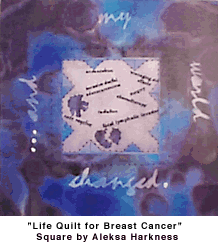 |
The time following my partner's breast cancer diagnosis
in the summer of 1995 was washed by fear, confusion and despair. My world
imploded, became a black hole into which I plunged.
My quilt square reflects that collapsed world,
and though I am some distance from those feelings now, working on it brought
them all back. I felt a lot of sadness while working on it, and grateful
for the chance to tell my/our story and to have it woven with the stories
of others whose lives are touched by breast cancer.
Aleksa Harkness
New Westminster, B. C. |
The first panel, "Cut in Prime", shows a clear-cut forest representing
the destruction caused by breast cancer - the initial diagnosis, surgery
and treatment. The second panel, "Call to Rebirth", reveals the
previously clear-cut forest beginning to re-grow, symbolizing hope and
rebirth. The third and final panel, "Green Canopy", displays
the new forest canopy with its scars and changes and embodies the themes
of integration and healing. 136 individual 6 inch by 6 inch quilt squares
border each of these three panels. Every one of these squares tells a personal
story of love, loss, courage or hope. The three center panels are watercolor
paintings on cotton fabric. Gold, silver and bronze metallic thread is
used to hand stitch the three layers of the quilt together (painting, batting
and backing cloth).
The next scheduled event is a show at the "Quilt Canada" exhibition
to be held at the Asian Center on the University of British Columbia campus
in Vancouver from May 25 to May 31.
For more information write Jan Muirhead at
1115 160A Street, Surrey, B.C., Canada V4A7G9 or contact her by e-mail
at keithm.direct.ca or write to Anne Massey at 218 15991 Thrift Street,
White Rock, B.C., Canada V4B2M9.
|
